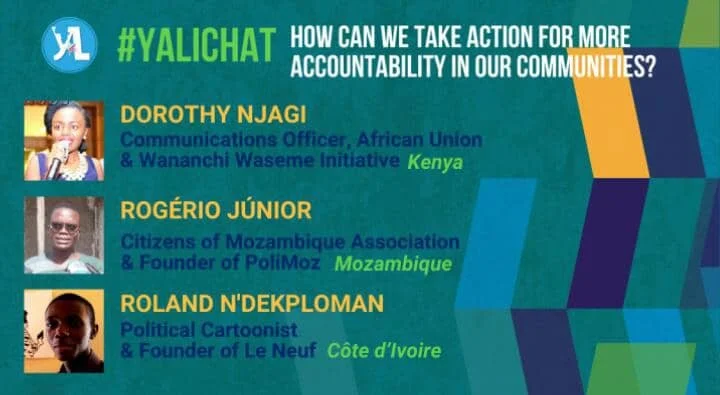Your Top Five Integrity Questions, Answered
On January 8, 2020, Rogerio Junior and Dorothy Njagi took questions from YALI Network members about transparency, integrity and more. Read a selection of questions and responses from the discussion below.
Address Fears
Hi, my name is Zeitun Mohammed from Kenya. I am a volunteer, a peace promoter, and a human rights defender. My community is facing a lot of problems and they have fear and trust issues with security agencies. It’s hard for a resident to talk freely to any security agent. What can I do to improve this issue and build trust between my community and security agencies? – Aden Mohammed Zeytun
Zeytun, it is unfortunate that there are trust issues with security agencies, who ordinarily are supposed to make you feel safe. In this scenario, I would advise you to take advantage of public participation forums as provided in the Kenyan constitution and bring up this issues or have a representative of the youth or other stakeholder bring it up for discussion. Together, you can brainstorm solutions tailored to your community. You can also utilize other platforms like Chief Barazas or even religious gatherings where you can lobby religious elders to bring up these issues. While at it, make sure you bring out clearly the status quo of the matter (i.e., the current situation and what will happen if things do not change). – Dorothy Njagi
Combat Violence
“I would love to better understand how to change the youth mindset from being violent and radical to being peaceful, especially during a period of conflict in my region. ”
Hello, Marina. Thank you for your very interesting question. I think that violent and radical behavior results mainly from the exclusion of young people from the process of social, economic, and political development in their community. When young people are excluded, they are likely to adopt attitudes of violence against the community itself. To convert this scenario, you can follow the following two procedures that I consider pertinent:
Dissuade young people from getting involved in conflicts through the use of theater, music, or movies.
Build a spirit of peace, friendship, and cooperation among young people through the promotion of community service, sports, and other engagement programs. – Rogério Júnior
Persevere in the Face of Obstacles
“I want to learn how to be a committed, transparent, and accountable leader even when I’m faced with a lot of oppositions and feel like giving up. It’s really challenging being an honest leader. Is it possible to have an honest and incorruptible leader? ”
Mariam, indeed it is possible to have an honest leader who does not subscribe to corruption. It may feel like a tall order today but with the right principles and a focus on our long-term goals, it can be achieved. It is said that enthusiasm leads to the starting line but perseverance leads to the finish line. To be a transparent and accountable leader, one must have individual integrity which is a personal, not communal, value. As a leader, one must remain committed to their values and principles and not influenced by those of others. – Dorothy Njagi
Fight for Inclusion
What are the best tools to make an impact in my community such that community members will be fully involved to ensure sustainable change? And in a society like my own full of corrupt practices, tribalism, and civil wars, how can one really make a difference and end corruption? – Rinda Khaweb, Cameroon
Rinda, there are no finished tools for impacting your community. You should look at what the aspirations are of, for example, young people in Cameroon. If they like to listen to music, then use music to engage them. What I am saying is that it is important to find something that captivates people and use it for their involvement in local development. Regarding tribalism, I have a question: Do you have difficulties relating to tribes other than yours? If the answer is yes, then why is there tribalism? If tribes, for example, communicate and live together harmoniously, then I think it is worth reinforcing this message of brotherhood and spreading throughout the country. But if tribalism results from social exclusion, then I think you must create initiatives that fight for the inclusion of people regardless of their race, color, tribe, language, etc. – Rogério Júnior
Be a Role Model
Young people that aspire to be political leaders and serve their communities have nobody to look up to as a majority of the political leaders are corrupt. Hence, these young leaders enter the system having already tainted because corruption has become a culture. What can be done to stop this and to ensure that youth enter leadership roles with the sole purpose of improving the lives of citizens? – Zinhle Myeni
Zinhle, while corruption is widespread in Africa, there are always good examples aspiring young leaders can follow. The corrupt behavior of an individual results largely from his character, that is, it does not depend on his academic degree. To ensure that young leaders are not corrupt, it is important to shape their character and the sooner the better. Likewise, to encourage anti-corruption, the entire community must come together and honor leaders who are guided by an anti-corruption posture. Then, think about strong examples within your community in the anti-corruption fight. If you identify one, share his or her example to inspire others. – Rogério Júnior
The views and opinions expressed here belong to the author and do not necessarily reflect those of The Youth Cafe.


